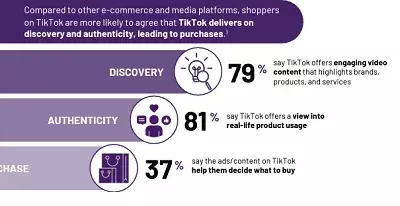The social media landscape is constantly evolving, and TikTok has emerged as a formidable player in the space, particularly regarding product discovery and shopping. As discussions intensify about its potential removal from the U.S. market, TikTok has taken a strategic step by collaborating with Ipsos to unveil a survey report. This report aims to analyze the platform’s role as an e-commerce facilitator and evaluate user behavior related to purchasing through the app. Given TikTok’s growing influence, understanding its value proposition as a shopping tool is increasingly vital for retailers, particularly in the current climate of uncertainty surrounding its operations in the United States.
The survey conducted by Ipsos, which included insights from 3,876 U.S. internet users, sheds light on how TikTok is changing consumer purchasing habits. One of the primary takeaways is the app’s effectiveness as a product discovery engine. Unlike traditional e-commerce websites, TikTok leverages the popularity and relatability of its creators to provide unique product insights. Users are not merely passive consumers; they are actively engaging with content that influences their shopping behaviors, thereby making TikTok a significant player in the modern eCommerce landscape.
TikTok’s format—short, engaging videos—encourages a more dynamic interaction with products, enabling users to see items in action. These trends point to a shift in how consumers discover products; rather than sifting through static images or website listings, users are influenced by authentic, vibrant experiences that resonate with their preferences. This evolving interaction is crucial; it not only fosters a community of shoppers but also encourages impulse buying—a trend that brands can capitalize on.
The report delves into the sentiment of TikTok users as compared to other e-commerce platforms. It appears that TikTok is making strides in presenting a broader range of trending products, effectively catering to a user demographic that values creativity and engagement over the traditional e-commerce shopping experience. Users express a preference for TikTok’s unique approach, suggesting that the platform is seen not just as an entertainment channel but also as a viable shopping alternative.
While TikTok has not yet reached the same level of sales dominance as its Chinese counterpart, Douyin, the data shows increasing comfort among users when it comes to purchasing via the app. The findings highlight a noteworthy trend: as users become more acquainted with buying products through TikTok, the potential for the app to evolve into a more significant commerce player becomes apparent.
For retailers, the implications of TikTok’s rising influence cannot be ignored. The report outlines strategies for businesses to utilize the platform effectively. Retailers are encouraged to experiment with creator partnerships, utilize trending challenges, and engage with the community through authentic content. This points to a broader marketing strategy that pivots from traditional advertising to embracing user-generated content, which resonates more with younger demographics.
Despite the looming threat of TikTok’s potential exit from the U.S. market, brands should consider innovative ways to integrate into the platform. The insights provided in the report emphasize the necessity for retailers to adapt quickly and experiment with their marketing strategies on social media platforms, where newer generations are increasingly making purchasing decisions.
As the discussion surrounding TikTok’s future remains fluid, with government pushback and ownership debates, many retailers might be left pondering the relevance of such insights. However, even amid uncertainty, the report provides valuable foresight into consumer trends. TikTok’s ability to captivate audiences through its creative content may not only define its e-commerce trajectory but also serve as a blueprint for other platforms aiming to enhance user engagement and increase sales.
While the fate of TikTok in the U.S. hangs in the balance, the insights gathered from the Ipsos survey will be crucial for marketers and retailers looking to thrive in the digital age. Adaptation to consumer needs and an understanding of emergent platforms will ultimately determine success in the evolving eCommerce landscape.


Leave a Reply